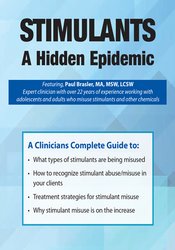

As many communities focus on the current opioid crisis, we have seen an alarming rise in people using cocaine, methamphetamines and designer stimulants like “Bath Salts.”
The misuse of these chemicals, including a surge in the use of stimulants among people being treated for opioid use disorder, has largely gone unnoticed. And yes, people die every day from mis-using stimulants, whether it’s sharing another person’s prescription or using methamphetamine.
Stimulants are everywhere, in energy drinks, prescription medications and illicit chemicals. Because of their prevalence, clinicians need to be equipped to recognize stimulant misuse and effectively intervene with their clients.
All mental health clinicians, not just those working in substance use treatment, need to be aware of stimulant misuse, the various chemicals mis-used and ways to treat these clients.
Paul Brasler has over 22 years of experience in working with adolescents and adults who misuse stimulants and other chemicals.
Watch Paul as he helps you better understand clients who misuse stimulants and the ways you can confidently help your clients.
In this recording and you’ll learn:
This online program is worth 2.75 hours CPD.
| File type | File name | Number of pages | |
|---|---|---|---|
| Manual - Stimulants: A Hidden Epidemic (4.40 MB) | 68 Pages | Available after Purchase |

Paul Brasler, LCSW, CAIP, has been a licensed clinical social worker for over 20 years. He is the owner of Providence Consulting & Education, LLC, through which he provides clinical supervision and professional education services. Additionally, Paul provides Ketamine-Assisted Psychotherapy and other clinical services as part of a small practice. Paul has extensive experience in working with people in crisis and people living with substance use disorders, including adolescent residential treatment, community mental health settings, hospital emergency departments, Juvenile Drug Court, and private practice.
Paul has been a PESI national presenter since 2016, and he has presented classes across the country on Mental Health Emergencies, High Risk Clients, Resiliency, and a certification course for clinicians working with people with substance use disorders. He has written two books: The Clinician’s Guide to Substance Use Disorders: Practical Tools for Assessment, Treatment & Recovery (PESI Publishing, October 2022) and High-Risk Clients: Evidence-Based Assessment & Clinical Tools to Recognize and Effectively Respond to Mental Health Crises (PESI Publishing, 2019).
Paul has been a PESI national presenter since 2016, and he has presented classes across the country on mental health emergencies, high-risk clients, resiliency, and a certification course for clinicians working with people with substance use disorders. His second book, The Clinician’s Guide to Substance Use Disorders: Practical Tools for Assessment, Treatment & Recovery, PESI Publishing, was published in October 2022. Paul lives in Richmond, Virginia, with his beautiful wife, three sons, a cowardly dog, and two dwarf rabbits who are quietly plotting to destroy the world.
Speaker Disclosures:
Financial: Paul Brasler maintains a private practice and has employment relationships with LifeStance Health and Alchemy Wellness. He receives a speaking honorarium, recording, and book royalties from Psychotherapy Networker and PESI, Inc. He has no relevant financial relationships with ineligible organizations.
Non-financial: Paul Brasler has no relevant non-financial relationships.
The Scope and Extent of the Problem
The Neurobiology of Stimulant Use
Identification and Assessment: What to Look for in Session and Beyond
Treatment Techniques You Need to Know
Satisfaction Guarantee
Your satisfaction is our goal and our guarantee. Concerns should be addressed to info@pesi.co.uk or call 01235847393.
Please wait ...